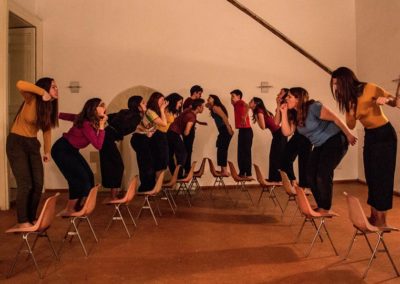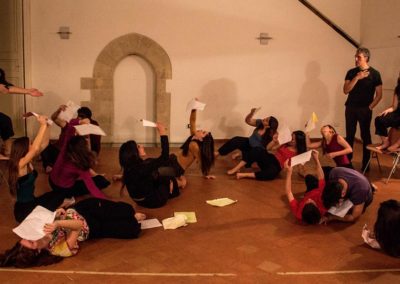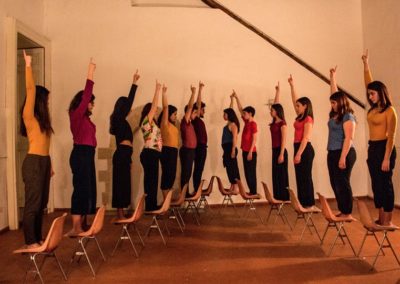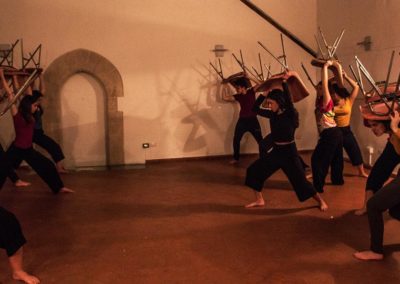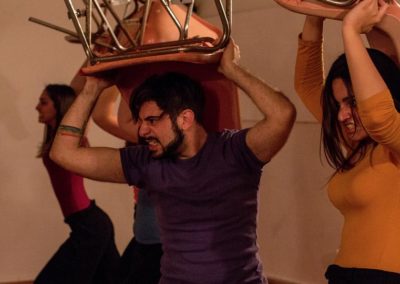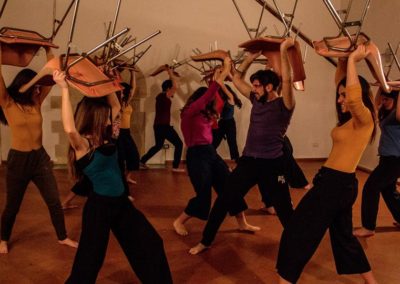SCHOOL
The youth section of the Academy was named after “Fernando Balestra” who relaunched the school in 2010 and was one of its biggest supporters.
The “Fernando Balestra” includes four sections: junior, spring, advanced spring and senior giving the opportunity to children and kids aged 6 and up and to adults, to take their first steps in the world of theater and discover an art that has always had the great ability to make people reflect on the world and on themselves.
The “Fernando Balestra” includes four sections: junior, spring, advanced spring and senior giving the opportunity to children and kids aged 6 and up and to adults, to take their first steps in the world of theater and discover an art that has always had the great ability to make people reflect on the world and on themselves.
TEACHERS
Fernando
Balestra
ACTING: Michele Dell’Utri
ACTING: Doriana La Fauci
ACTING: Giulia Valentini
DANCING: Serena Cartia
ACTING: Simonetta Cartia
DICTION: Ierna Attilio
SINGING/DICTION: Elena Polic Greco
ANCIENT DRAMATURGY: Giuseppina Norcia
Junior
(5-8 YEARS)
Junior Enfant
The “Junior Enfant” course is an introductory path to musical and body-expression theatrical activity, to reading aloud and group activities. The teachers will accompany the children in practical education activities to active listening and approach to books (reading of dramatized stories) and in expressive games that will favor the use of the body, voice and space as tools to communicate their own ideas and emotions, relationships with others, self-control and spontaneous expression.
The “Junior Enfant” course is an introductory path to musical and body-expression theatrical activity, to reading aloud and group activities. The teachers will accompany the children in practical education activities to active listening and approach to books (reading of dramatized stories) and in expressive games that will favor the use of the body, voice and space as tools to communicate their own ideas and emotions, relationships with others, self-control and spontaneous expression.
Junior
(9-11 YEARS)
(9-11 YEARS)
Junior Mythos
The “Junior Mythos” course has the primary purpose of “training” the perceptive, relational and expressive skills of the children. The first part of the work consists of group work techniques, self-control and expressiveness, rituals and social rules of collective participation, active listening techniques, discovery and awareness of one’s own means of expression. From this first phase (Training) we move on to the more strictly scenic phase. The work is on themes, texts, scenic writing, reading and interpretation. In a simple, playful and engaging way, children are invited to deepen a theme chosen in the previous phase, to elaborate (together with the teachers) a dramaturgical material (therefore a text written for the staging) that can then be represented. Through this game, children will discover and/or enhance their linguistic, bodily and musical means of expression, as well as writing, reading, choreography, singing and acting skills. The whole path is tailored to the needs of each individual participant, working indirectly also on educational objectives such as: self-esteem, shyness processing, self-control, coordination and teamwork.
The “Junior Mythos” course has the primary purpose of “training” the perceptive, relational and expressive skills of the children. The first part of the work consists of group work techniques, self-control and expressiveness, rituals and social rules of collective participation, active listening techniques, discovery and awareness of one’s own means of expression. From this first phase (Training) we move on to the more strictly scenic phase. The work is on themes, texts, scenic writing, reading and interpretation. In a simple, playful and engaging way, children are invited to deepen a theme chosen in the previous phase, to elaborate (together with the teachers) a dramaturgical material (therefore a text written for the staging) that can then be represented. Through this game, children will discover and/or enhance their linguistic, bodily and musical means of expression, as well as writing, reading, choreography, singing and acting skills. The whole path is tailored to the needs of each individual participant, working indirectly also on educational objectives such as: self-esteem, shyness processing, self-control, coordination and teamwork.
SPRING
(12 TO 24 YEARS)
(12 TO 24 YEARS)
The SPRING course is divided in:
Spring “Parodos” or Spring A (12 to 15 years), Spring “Hypocrites” or Spring B (16 to 24 years). The Spring course is directed to young people who want to know and deepen the theatrical disciplines: acting, diction, singing, stage movement. The path is divided into a first phase of conscious discovery of one’s own means of expression and in a second phase of practical realization of a theatrical performance (from reading and analyzing the text to staging). The educational objectives of the course are the acquisition and deepening of group work techniques, effective communication and listening techniques, the discovery of basic theatrical languages (text, body, voice). Teaching objectives are the acquisition of tools and techniques for the analysis and reworking of a text, diction, use of the voice, musicality and acting. The primary objective is to approach the theatre and the texts of the ancient literary tradition and modern and contemporary literature. Seminar activities on specific disciplines such as: voice education, stage fencing, make-up and scenography complete the training offer.
Spring “Parodos” or Spring A (12 to 15 years), Spring “Hypocrites” or Spring B (16 to 24 years). The Spring course is directed to young people who want to know and deepen the theatrical disciplines: acting, diction, singing, stage movement. The path is divided into a first phase of conscious discovery of one’s own means of expression and in a second phase of practical realization of a theatrical performance (from reading and analyzing the text to staging). The educational objectives of the course are the acquisition and deepening of group work techniques, effective communication and listening techniques, the discovery of basic theatrical languages (text, body, voice). Teaching objectives are the acquisition of tools and techniques for the analysis and reworking of a text, diction, use of the voice, musicality and acting. The primary objective is to approach the theatre and the texts of the ancient literary tradition and modern and contemporary literature. Seminar activities on specific disciplines such as: voice education, stage fencing, make-up and scenography complete the training offer.
senior
(FOR GROWN-UPS AND TEACHERS)
(FOR GROWN-UPS AND TEACHERS)
The section for grown-ups aims to raise awareness on and enhance an expressive use of communication and relationship tools for adults. The work involves the study of theatrical techniques of analysis and expressive reading, deconstruction and construction of a text, diction, public speaking (speaking in public with and without the aid of the microphone). The laboratory is also an opportunity for a in-depth study and thematic debate on the topics related to the proposed texts.

